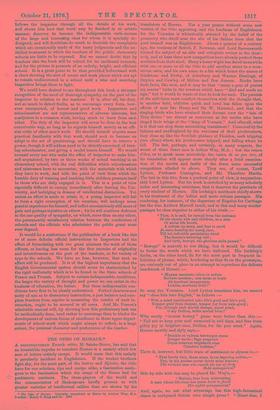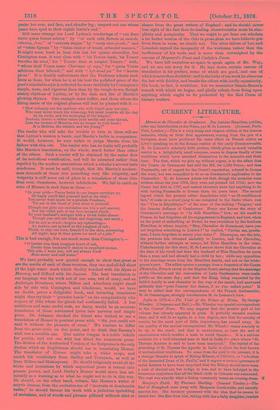THE ODES OF HORACE.*
ILA.
'London: Henry S. King and 0o. 1876 dance in unrhymed fetters over simple prose? "Heart-free, I A DISTINGUISHED French critic, M. Sainte-Beuve, has said that an irresistible impulse to translate Horace is a malady which few men of letters entirely escape. It would seem that this malady is peculiarly incident to Englishmen. If the weaker brethren fight shy, for the most part, of the Satires and Epistles, the Odes have for our scholars, ripe and unripe alike, a fascination analo- gous to the fascination which the songs of the Sirens had for prehistoric mariners. The chess-players of the world and the commentators of Shakespeare hardly present us with greater varieties of intellectual calibre than are shown by the * The Odes of Home. Literally translated in Metre by Arthur Way, translators of Horace. Not a year passes without some new version of the Odes appearing, and the fondness of Englishmen for the Venusian is whimsically attested by the belief of the peasantry who dwell near the site of his Sabine farm that the poet himself was an Englishman. About a quarter of a century ago, the versions of Sewell, F. Newman, and Lord Ravensworth formed the subject of an able and eulogistic review in the Quar- terly, and at least three new competitors have already pushed these worthies from their stooL Many a lesser wight has dared meanwhile with one or more or all the Odes to add another stone to a mon- strous cairn, and his own name to a list which bears the names of Gladstone and Derby, of Atterbury and Warren Hastings, of Dryden and Cowley, of Milton and Ben Jenson. Books have their fates, like men, and it may be that "many a gem of purest ray serene" lurks in the versions which have "died and made no sign," but it would be waste of time to look for such. The parents of the still-born must comfort themselves with the thought that, in another field, oblivion quick and total has fallen upon the efforts of men like Drury and Sir W. Herschel, and that the singing-birds who have strained their throats over the "tale of Troy divine" are almost as numerous as the moths who have singed their wings at the "lamp of Venuaia." And after all, what is it that can stop these astonishing translators? Unmoved by the failures and unaffrighted by the successes of their predecessors, they close up like the Scottish phalanx at Flodden, each tripping (too often) where his predecessor tripped, and falling where he fell. The last, perhaps, and certainly, in many respects, the worst of these brave men is Arthur Way, M.A. ; but the raison d'être, or to speak more accurately, the raison de ne pas 'etre, of his translation will appear more clearly after a brief examina- tion of the merits and faults of the three more successful competitors alluded to above. They are, of course, Lord Lytton, Professor Conington, and Mr. Theodore Martin. The last in this trio, from a poetical point of view, is unquestion- ably Lord Lytton. But his work is enriched by so many scholarly notes and interesting criticisms, that it deserves the gratitude of every student of Horace. His lordship's merits are chiefly shown in his treatment of the loftier and more solemn passages. His rendering, for instance, of the departure of Regulus for Carthage has the true Andrew Marvell touch, and in this and many similar passages he rises superior to either of his rivals "Then, it is said, he turned from the embrace Of his chaste wife and children, as a man Of social life bereft, A citizen no more, and bent to earth In stern humility his manly face, Till his inflexible persistence fixed The Senate's wavering will ; And forth, bewept, the glorious exile passed."
" Bewept" is scarcely to our liking, but it would be difficult to better the words which we have italicised. His lordship's faults, on the other hand, lie for the most part in frequent in- felicities of phrase, which, bordering as they do on the grotesque, are curiously out of place in an attempt to reproduce the delicate handiwork of Horace :—
".7Eqtram memento rebus in arduis Servare mentem; non watts in bonis Ab insolenti temperatam moriture Delli 1" So sang the Venusian. Lord Lytton translates him, we cannot say "does him into English," as follows
'With a mind undisturbed take life's good and life's evil, Temper grief from despair, temper joy from vain-glory; For, through each mortal change, equal mind, 0 my Dellius, befits mortal born I"
Why surely "honest kersey " prose were better than this :— "Fail not to keep your soul unmoved in evil days, and free from giddy joy in brighter ones, Dellius, for die you must." Again, Horace merrily and slyly says,—
" Brachia et vultam teretesque auras Integer laudo; Inge suspicari Cujus octavum trepidavit sites Claudere lustrnm." There is, however, but little trace of merriment or slyness in,— " That lovely face, those arms, those tapering ankles,— Nay, in my praises never doubt mine honour ; The virtuous man who rounds the age offorty Hold unsuspected?' Side by side withthis may be placed Mr. Way's,—
"Refrain thee from mistrusting A man whose life-time has made haste to finish His eighth guinguenniad."
And, again, we ask what advantage has this high-fantastical
praise her arm, and face, and slender leg ; suspect not one whose years have sped to their eighth lustre's end."
Still more strange are Lord Lytton's renderings of "ant fore term quem ferant solutaa " by "or such rath flowers as swards, relaxing, free ;" of " extenta stag,na " by "vasty stew-ponds ;" and of "triste ligntun " by "felon-traitor of wood, arboretal assassin." It might seem hard to beat this last for quaint absurdity, but COnington runs it very close with " 'tis Teucer leads, 'tis Teucer breathes the wind," for " Teucro duce et auspice Teucro ;" with, "whom shall Venus name Chairman of cups," for " quem Venus arbitrum dicet bibendi ;" and with "left-hand pie" for " laevus pious." It is doubly unfortunate that the Professor admits such blots as these, for when he is at his best the polished grace of the
poet's inimitable style is reflected far more faithfully by Conington's simple, terse, and vigorous lines than by the rough-hewn, though stately rhythms of Lytton, or by the dash and fire of Martin's glowing rhymes. One example must suffice, and those whom the lilting metre of the original pleases will best be pleased with it :—
"How unhappy are the maidens who with Cupid may not play,
Who may never touch the wine.cup, but must tremble all the day At an uncle, and the scourging of his tongue!
Neohule, there's a robber takes your needle and your thread, Lets the lessons of Minerva run no longer in your head ; It is Hebras, the athletic and the young!"
The reader who will take the trouble to turn to them will see that Lytton's version is harsh, and Martin's feeble in comparison.
It would, however, be very unfair to judge Martin from his failure with this ode. The reader who has no Latin will probably like Martin's translation, on the whole, much better than either of the others. Such a reader will be charmed by the easier flow of its melodious versification, and will be attracted rather than repelled by the modern associations which a scholar's severer taste condemns. It must be said, though, that Mr. Martin's modern-
ness descends at times into something very like vulgarity, and vulgarity is still more out of place in a translation of these Odes
than even clumsiness, however infelicitous. We fail to catch an echo of Horace in such lines as these :—
"In your pride—Venus hates it—no longer envelope ye, Or haply you'll find yourself laid on the shelf;
You never were made for a prudish Penelope, 'Tis not in the blood of your sires or yourself.
Though nor gifts nor entreaties can win a soft answer, Nor the violet pale of my love-ravaged cheek,
To your husband's intrigue with a Greek ballet-dancer Though you still are blind, and forgiving, and meek ;
Yet be not so cruel—forgive my upbraiding— As snakes, nor as hard as the toughest of oak ; Think, to stay out here, drench'd to the skin, serenading
All night, may in time prove too much of a joke."
This is bad enough, but not much worse than Conington's,— " 0 harder e'en than toughest heart of oak,
Deafer than tuscharm'd snakes to suppliant moans,
This aide, I warn you, will not always brook Rain-water and cold stones."
We have probably now quoted enough to show that great as are the merits of each of these versions, they one and all fall short
of the high-water mark which Shelley touched with his Hymn to Mercury, and Gifford with his Juvenal. The best translation in our language was the work not of one man, but of many, and an Anthologia Horatiana, where Milton and Atterbury might stand side by side with Conington and Gladstone, would, we have no doubt, prove a delightful book, and intending translators might then try their " 'prentice hands" on the comparatively vilia corpora of Odes where the giants had confessedly failed. A less
ambitious and more useful task, we fancy, would be an accurate translation of these celebrated lyrics into nervous and simple prose. Dr. Johnson checked the friend who wished to see a translation of Homer in poetical prose with, "Sir, you could not read it without the pleasure of verse." We venture to differ from the great critic on this point, and to think that Ramsay's wish was a sensible one. Our native tongue is a noble vehicle for poetry, and not one whit less fitted for numerous prose. The diction of the Authorised Version of the Scriptures is the only diction which an Englishman should use in translating Homer. The translator of Horace might take a wider scope, and enrich his vocabulary from Shelley and Tennyson, as well as from Milton and Shakespeare. Ile should religiously avoid all the tricks and inversions by which unpoetical prose is turned into prosaic poetry, and Lord Derby's Homer would serve him ad- mirably as a warning as to what he ought not to do in this way. He should, on the other hand, refrain, like Horace's writer of satyric dramas, from the exclusive use of " inornata et dominantia verba;" he should flavour his work with a judicious sprinkling of archaisms, and of words and phrases pilfered without stint or
shame from the great writers of England ; and he should never I lose sight of the fact that its leading characteristics must be sim- plicity and perspicuity. That we ought to get from our scholars, a far better version of the Odes in prose „than we have hitherto got- from them in verse, we doubt not. The utter failure of Lee an Lonsdale armed the incapacity of the workman rather than the- inefficiency of his tools, and is more than outweighed by the- success of Hayward's Faust and Carlyle's Dante.
We have left ourselves no space to speak again of Mr. Way,. and we are not sorry for it. Ile lays down certain canons of translation in his preface, some of which are good, and one of which is more than doubtful ; and in the body of his work he observes. the last with fidelity, and breaks the others with lordly equanimity.. His book, in fact, is worthless ; but we remember Sainte-Beuve's. remark with which we began, and gladly refrain from firing upon, anything which ought to be protected by the Red Cross of literary warfare.



































 Previous page
Previous page